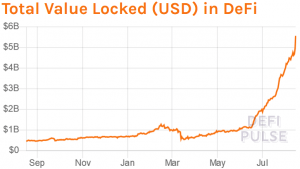Ripple CEO Confirms Strategy, DeFi Locks USD 5.6bn + More News
Get your daily, bite-sized digest of cryptoasset and blockchain-related news – investigating the stories flying under the radar of today’s crypto news.

Altcoins news
- Ripple CEO Brad Garlinghouse responded to The Financial Times report which stated that the company was moving away from wholesale cross-border payments, towards a platform offering payment services for financial institutions and everyday consumers. Garlinghouse tweeted that “Ripple has absolutely no plans to ‘reset’ our strategy,” that “using XRP to solve a real-world, [USD] 10T problem, like cross-border payments, is working,” as well as that ODL (product that uses XRP) accounted for more than USD 2 billion in transactions since its launch.
- The price of chat app giant Kakao’s klay tokens is rising as the company “quietly expands” its blockchain and crypto ecosystem, reported Decenter. The media outlet stated that the introduction of staking services for klay on Kakao apps may have helped spur growth this month. Per data from Coinone, a South Korean crypto exchange that has listed the token, 1 klay was trading for USD 0.15 on August 1, a figure that climbed up to USD 0.8 on August 13.
DeFi news
Total value locked in decentralized finance (DeFi) has surpassed USD 5 million, reaching USD 5.56bn today (17:33 UTC). To put this increase into perspective, this number had hit USD 1 billion in May this year.

Source: defipulse.com
Blockchain news
- Lotte, a multi-billion dollar South Korean business conglomerate, is set to link its loyalty point program with a blockchain-powered donations platform, per the Electronic Times. The media outlet reported that Lotte has signed a deal with e4net, operator of the Cherry donations platform. The deal will allow Lotte L.point holders to use their loyalty points to contribute to charitable causes.
- Five companies have so far taken out blockchain-powered power outage insurance policies in Zhejiang Province, in the east of China, reported media outlet Yingda. The policies are being offered by insurance companies working in conjunction with local branches of the national electricity monopoly, the State Grid Corporation of China. The latest company to take out a policy is a Ningbo-based cosmetics packaging firm.
NFT news
- BBC Studios gave an exclusive global license to the UK-based mobile game publisher Reality Gaming Group to develop a digital trading card game on the ethereum (ETH) blockchain for its popular sci-fi TV series, Dr. Who, said the company. Fans will be able to collect and trade digital versions of their favorite characters, while each trading card a player collects will be tokenized into a non-fungible token (NFT). Limited-edition packs containing five digital cards will be available for fans to buy beginning in October, per License Global report.
Legal news
- Law firm JPB Liberty filed a class-action lawsuit in the Federal Court of New South Wales against Facebook and Google. As reported, the firm claims that the two giants, along with Twitter, have engaged in an illegal attack on the crypto industry, with their ban on crypto-related advertising.
- New York attorney Aaron Etra was ordered to pay nearly USD 5.26 million, as well as 4% interest for violating his contractual duties to San Francisco crypto investment firm Benthos Master Fund. According to a document filed at the district court in the Southern District of New York, Etra was the firm’s escrow agent in 2018, entrusted with holding USD 5 million for bitcoin (BTC) purchases, and Benthos argued that Etra had moved money out of escrow without authorization.
- The US Justice Department executed “the government’s largest-ever seizure of cryptocurrency in the terrorism context.” They eliminated efforts by the military wing of Hamas, al Qaeda, and Islamic State to raise funds via cryptocurrency through schemes that included selling bogus COVID-19 safety equipment to US hospitals, reported Reuters. They seized around USD 2 million, as well as 300 cryptocurrency accounts, four websites, and four Facebook pages.
Mining news
- Revenue of Canadian Bitcoin miner Hut 8 dropped by 67%, to USD 9.2m in the second quarter this year, compared to the same quarter last year. Net income decreased by almost 91%, to USD 2.8m, the company said. As a reminder, the third Bitcoin halving happened this may, slashing the block subsidy in half. However, the company said that its strategy of mining and holding BTC continued to pay off as there was a USD 9.4m gain on the re-measurement of BTC holdings in Q2-2020. Additionally, by strategically selling BTC at peak prices, Hut 8 recorded a USD 0.7m gain on use of digital assets.





